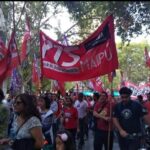
The plenary session of the Constitutional Court has partially upheld the appeals of the two former presidents of the Andalusian Government convicted in the ERE case: Manuel Chaves and José Antonio Griñán. In the case of Chaves, the judges ordered the Seville Court to reconsider and reduce his sentence of nine years of disqualification for a crime of prevarication. In the case of Griñán, the sentence annuls his sentence of six years of prison for embezzlement and also orders a new resolution from the Seville court to reduce the 15 years of disqualification imposed on him for prevarication. The two decisions have come shortly after the Constitutional Court, by unanimous vote of conservatives and progressives, flatly rejected the recusals that the PP presented at the last minute against several judges.
The court of guarantees has been studying for weeks the appeals of the former senior officials of the Junta de Andalucía in the case of the ERE: the multimillion-dollar system of public aid to companies and workers that, according to the Supreme Court, was based on a lack of control established and maintained by the governments of the socialists Manuel Chaves and José Antonio Griñán. The first was sentenced to nine years of disqualification for prevarication and the second to six years in prison, with the judges adding the sentence of misappropriation of public funds.
The various sentences have fully or partially upheld the appeals of almost all of the convicted. In some cases, such as that of Carmen Martínez Aguayo, the sentences have been completely annulled. In others, such as that of Magdalena Álvarez, the Seville Court has been ordered to repeat its sentence but, in practice, reduce its sentence by excluding a large part of the acts that had been considered criminal.
The plenary, with the four conservative judges voting against, has understood in most of the cases that it has studied that many of the acts condemned as prevarication and embezzlement were political acts of the Andalusian government that could not be criminalized: preparing draft or budgetary projects, for example, which were later approved by the Parliament of Andalusia. Also that in other cases several former high-ranking Andalusian officials were condemned without sufficient arguments by the Court of Seville and the Supreme Court.
In the case of prevarication, the Constitutional Court understands that Griñán and Chaves have been convicted in an “unforeseeable” manner: a draft law and its approval as a project “cannot constitute the crime of prevarication”, the ruling recalls. It is not a resolution that forms part of an administrative matter but “acts dictated by the Executive Power in the exercise of its function of government attributed to it by the Statute of Autonomy of Andalusia”.
The prevarication, in the case of both former Andalusian presidents, must be examined again by the Provincial Court of Seville in order to reduce the nine-year disqualification sentence for Chaves and the 15-year sentence for Griñán, but withdrawing a large part of the accusations. Neither the preliminary drafts nor the budget proposals can be considered criminal, nor can various budget modifications, but leaving the door open for them to be convicted for one of them: that of December 2004 in program 3.2H “given that the purposes of said program were not the granting of social and labor aid.”
Eliminates jail sentences for embezzlement
In the case of Griñán, the Constitutional Court’s ruling removes his six-year prison sentence for the crime of embezzlement. The progressive majority in the plenary session understands that, as with prevarication, it is “unforeseeable” that these actions by the Andalusian government would be considered a criminal offence. And as in other cases, they recognise that some dispositions of public funds could indeed be embezzlement but that Griñán was convicted without sufficient arguments.
“The judicial motivation lacks sufficient argumentative development to consider proven that the acts imputed to him have been committed by the plaintiff,” says the Constitutional Court about José Antonio Griñán, who presided over the Junta de Andalucía between 2009 and 2013. Criminal liability cannot be “automatically” transferred from those who managed the aid directly to those who “limited themselves to approving the corresponding budget items.”
The courts exempted José Antonio Griñán from serving a prison sentence for the cancer he suffers from, but other former senior officials of the Andalusian Government have been released in recent weeks after seeing their appeals for protection upheld in whole or in part. The first was Miguel Ángel Serrano, former director general of the former Institute for the Promotion of Andalusia, after a year and a half behind bars. This week, former minister Antonio Fernández and former deputy minister Jesús María Rodríguez also left prison.
This Tuesday, the Constitutional Court, for the first time, rejected the appeal of one of the convicted men after examining the merits of the case. It was that of Juan Márquez, first Minister of the Economy and then Director General of Labour, sentenced to seven years in prison for prevarication and embezzlement. In his appeal he only claimed that his right to the presumption of innocence had been violated, as well as other rights that the Constitutional Court did not consider to have been harmed. “The contested resolutions do sufficiently reason, in accordance with rational and logical criteria, that Márquez was aware that the funds from the 3.1L programme were used for purposes completely unrelated to those established by law,” says this ruling.
Shortly before the deliberations began, the Constitutional Court rejected the recusal that the PP had presented in recent days against two judges from the progressive sector: María Luisa Balaguer and Inmaculada Montalbán. The plenary, by unanimous vote of conservatives and progressives, decided to reject them because they had been raised out of time.
Source: www.eldiario.es

